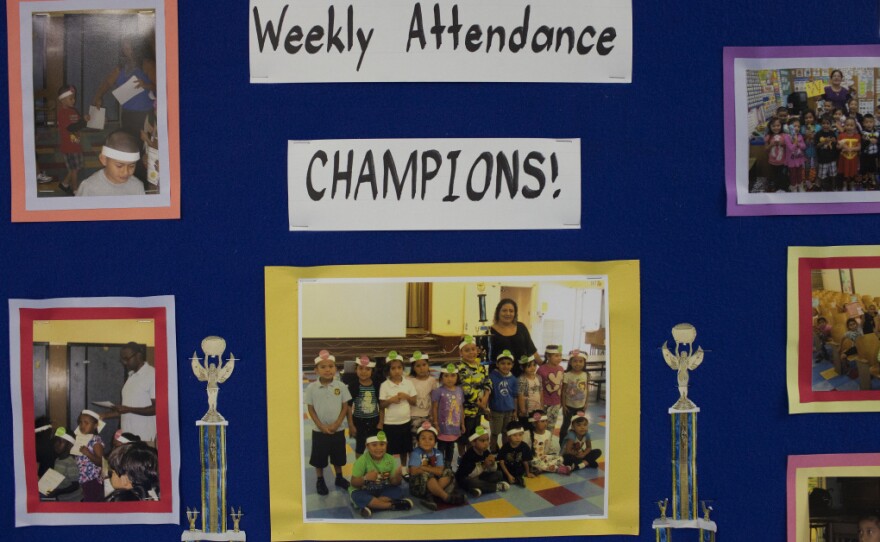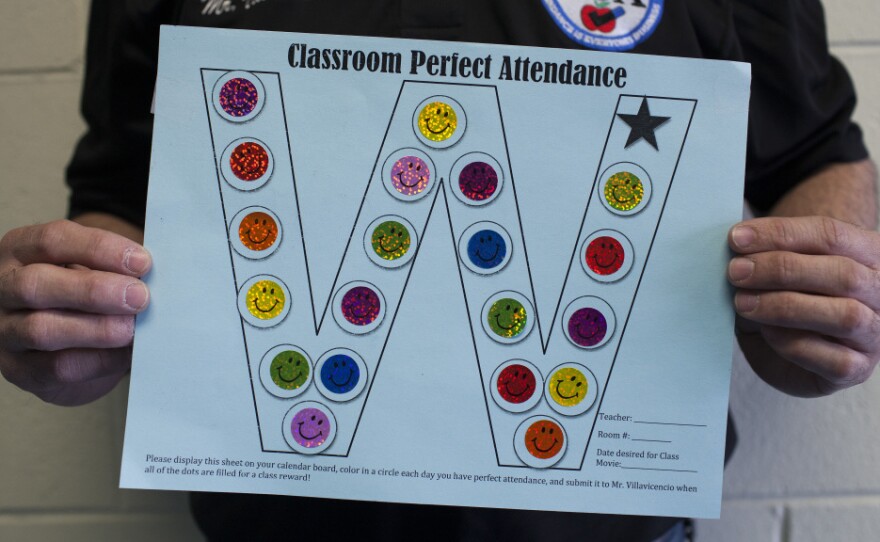

In kindergarten, kids are learning really important stuff. Basic reading skills. Numbers and math concepts. And to keep from falling behind, one of the major things they need to do is make it to school every day.
In Los Angeles, the nation's second largest school district, kindergarten absence is a big problem, with some students missing 10, 20, 30 days or more. In 2012, district officials say that almost 10,000 students were chronically absent from kindergarten. Last year that number it improved, but only slightly.
It's a problem around the country as well, and research confirms the academic peril chronic absence creates for the youngest students.
A 2008 report from the National Center for Children in Poverty found that children who missed more than 10 percent of school in kindergarten were the lowest-achieving group in the first grade.
And so the Los Angeles Unified district has mounted a big push, putting educators in schools whose mission is to get these children to school every day.
At Lenicia B. Weemes Elementary School in south LA, that mission has fallen to Hugo Villavicencio. As the school's attendance improvement counselor, his main task is to reverse dismal attendance of its youngest learners. His job is equal parts motivational fun-guy for students ... and coaxing enforcer for slacking parents.
Today he's got a kindergarten class fired up.
"Do you know why I'm here?" he challenges the class.
"Yes!" they shout: "Prizes!"
The students are fixated on his brightly colored Treasure Box, and he's picking attendance-prize winners from a bunch of popsicle sticks with their names on them.
"And the first person is ... LaMaya," says Villavicencio.
"Not here," the students respond.
"What happened to LaMaya?"
"She's absent," a student explains. "She went to the doctor."
Illness and poor health care, lack of transportation, extended trips to home countries, and heavy work demands on parents — these are just a few of the reasons, research shows, that attendance is a problem in many low-income communities.
Maria Ramirez Waight, a kindergarten teacher at Weemes, sees the problem every day. At age 5, she says, these kids are learning important concepts that are the building blocks for future learning.
"And of course when they miss just one day ... you have to constantly go over the things they are missing to try and catch them up," she says. "So you're playing catch-up with certain kids all year long."
Villavicencio agrees: "It takes them four days on average to catch up on what they might have missed on one day."
The school's target, he adds, is that "in the whole school year a student should not be absent more than seven times. Unfortunately, for this school we had less than half the kids reaching that goal."
Mr V., as the kids call him, has finished handing out his prizes for attendance. Now he's on to his second strategy: peer pressure inside each class to get every kid to show up every day.
"Sorry for the interruption," he says to the next class. "Guess what I'm bringin' back?"
The kids shout: "A trophy!"
"Your attendance was so good," Mr. V. tells them, "that I have to bring this back to the champions for the week. Alright, good job!"
In his office, Villavicencio is much less upbeat. He's a data guy, and shows me the daunting statistics: "I'm analyzing the way that we have been so far this school year. And the lowest point was December. December was the month when we had 52 percent attendance."
January, he adds, wasn't much better.
And so begins the much less enjoyable part of his job: phone calls to parents of absent kids.
His first call turns out to be a wrong number. That's not unusual, Mr. V. explains. Pay-as-you-go phones are common for the very low-income families here, and numbers change constantly.
His second call is a wrong number, too. So he tries the student's grandmother. "She has missed more than 30 days, correct," he says into the phone.
The grandmother doesn't know where the mother is, but agrees to pass along his message.
Then, just as he's about to call the next parent on his list, one mother he's been trying to reach, Zaida Ayala, shows up. Her son started kindergarten but almost immediately began missing days. "I live far and I don't have transportation," Ayala tells me. She explains that she doesn't have a car and the price of riding the bus has gone up.
She knows how important it is for her son to make it to school, and that he's missed too many days.
"That does kind of scare me," she says. "Earlier when he used to miss a lot my son would tell me, Mommy, you have to take me to school every day."
But like many parents in this neighborhood, the demands of work and parenting and making ends meet are huge. Ayala says that while she did not finish high school herself, she wants her son to do better. So, she's looking for a job so she can buy a car. For Mr. V., the day's not over yet. He's got one last tour through the classrooms, one last shot to get kids to show up the next day. "Remember come to school every day!" he tells the students as he heads out.
And the students shout back, "Bye, Mr V!"
Copyright 2015 Southern California Public Radio. To see more, visit http://www.kpcc.org/.






